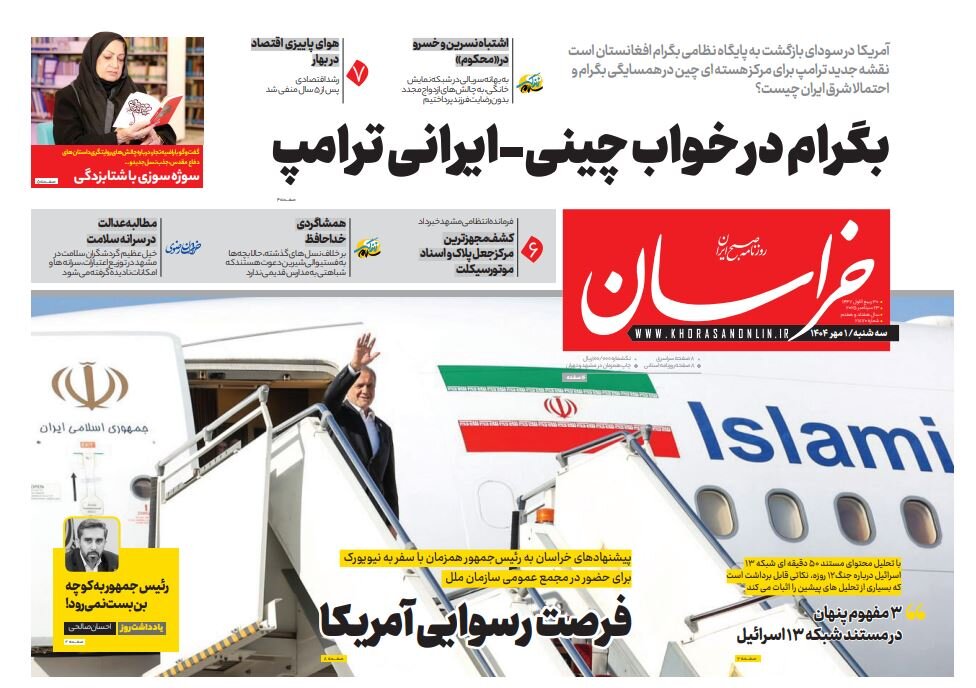A valuable statement against snapback

TEHRAN - In a note, Khorasan discussed the importance of the Supreme National Security Council’s statement in response to the activation of snapback sanctions by the European troika of Britain, France and Germany.
It wrote: The Supreme National Security Council’s statement in response to the start of the snapback process is very valuable and commendable. There are several basic points about this text. First, it shows that the Islamic Republic makes decisions in a unified manner and with consensus among all its top-level officials. Second, the statement shows that the Foreign Ministry is the most important body in charge of foreign policy. But more important than these two issues are the strategic statement that says, “With the actions of European countries, the path of cooperation with the Agency will be suspended.” This unified position in difficult situations is what we need today. If we really put what we said into practice and break the enemy’s estimates, we will probably have an improved situation. Any delay in this regard will mean giving in to further pressure and more and deeper problems.
Etemad: A meaningful trip with active diplomacy
Etemad covered President Masoud Pezeshkian’s visit to New York in an interview with Mohammad Javad Haghshenas, a reformist political activist. Haghshenas said: Pezeshkian’s trip represents one of the most significant opportunities for the country and must be fully utilized. He warned that if the visit is merely ceremonial, it will not serve Iran’s interests. To navigate the current crises, Iran requires a dynamic and proactive diplomacy—one that is attuned to timing, context, and audience. This trip should be strategically planned and executed with the global stage in mind. The goal of the visit should be to establish a distinct diplomatic capacity for Iran. Pezeshkian is well-positioned to foster regional alignment by promoting rational dialogue among neighboring countries. Additionally, the United Nations offers a platform for direct and bilateral engagement with European leaders and members of the UN Security Council. Constructive discussions with the European troika could yield meaningful outcomes. By leveraging Iran’s existing regional strengths—alongside emerging partnerships with countries like Egypt, Saudi Arabia, and Iraq—Iran can enhance its diplomatic weight and influence.
Iran: What will happen after quitting NPT?
In an analysis, the Iran newspaper examined the potential consequences of a proposed withdrawal from the Nuclear Non-Proliferation Treaty (NPT), an idea floated by some parliamentarians and political commentators. It wrote such a move would not benefit Iran—even in the medium term—given that Tehran has no intention of developing nuclear weapons. Exiting the treaty would expose the country to serious repercussions, including increased sanctions, mounting international pressure, and even the threat of military confrontation. Triggering a diplomatic impasse and shutting down avenues for dialogue would only deepen Iran’s isolation and intensify unlawful pressure on its citizens. In contrast, President Pezeshkian’s visit to New York, alongside his foreign policy team for the annual UN General Assembly, presents a strategic opportunity—provided that national interests remain the sole priority. Neither fear of negotiation nor blind optimism will serve Iran’s interests. Navigating this delicate path demands diplomatic precision and vigilance. With smart, proactive diplomacy, the president’s presence in New York could help ease international tensions and foster both regional and global cooperation. This appearance carries added weight in the aftermath of the recent 12-day war and Iran’s subsequent defense efforts.
Sobh-e-No: Is a meeting with Trump a guarantee?
In an article, Sobh-e-No dealt with the suggestions of some citizens and political analysts that the New York visit has provided an opportunity for talks between Iranian President Masoud Pezeshkian and U.S. President on the sidelines of the annual UN conference to possibly resolve the nuclear standoff between the two countries, writing: The important point is that a large part of the political wing that is today proposing a meeting with the U.S. President had previously paved the way for the failure of the JCPOA by blindly trusting Western promises. Those who thought that (John) Kerry's signature was a guarantee and that the UN Security Council resolution (2231) made the return of sanctions impossible have now experienced each of their views at the expense of the Iranian nation. The experience of the JCPOA and its consequences are a bitter but valuable lesson for the country's policymakers. Now, in a situation where the snapback mechanism has been activated and the country is facing sanctions, we are witnessing the continuation of the same ineffective approaches. This shows a failure to learn from past experiences and an insistence on repeating mistakes. If engaging with the U.S. and walking and smiling with them could have had any results, it should have been felt in the last ten years.
Leave a Comment